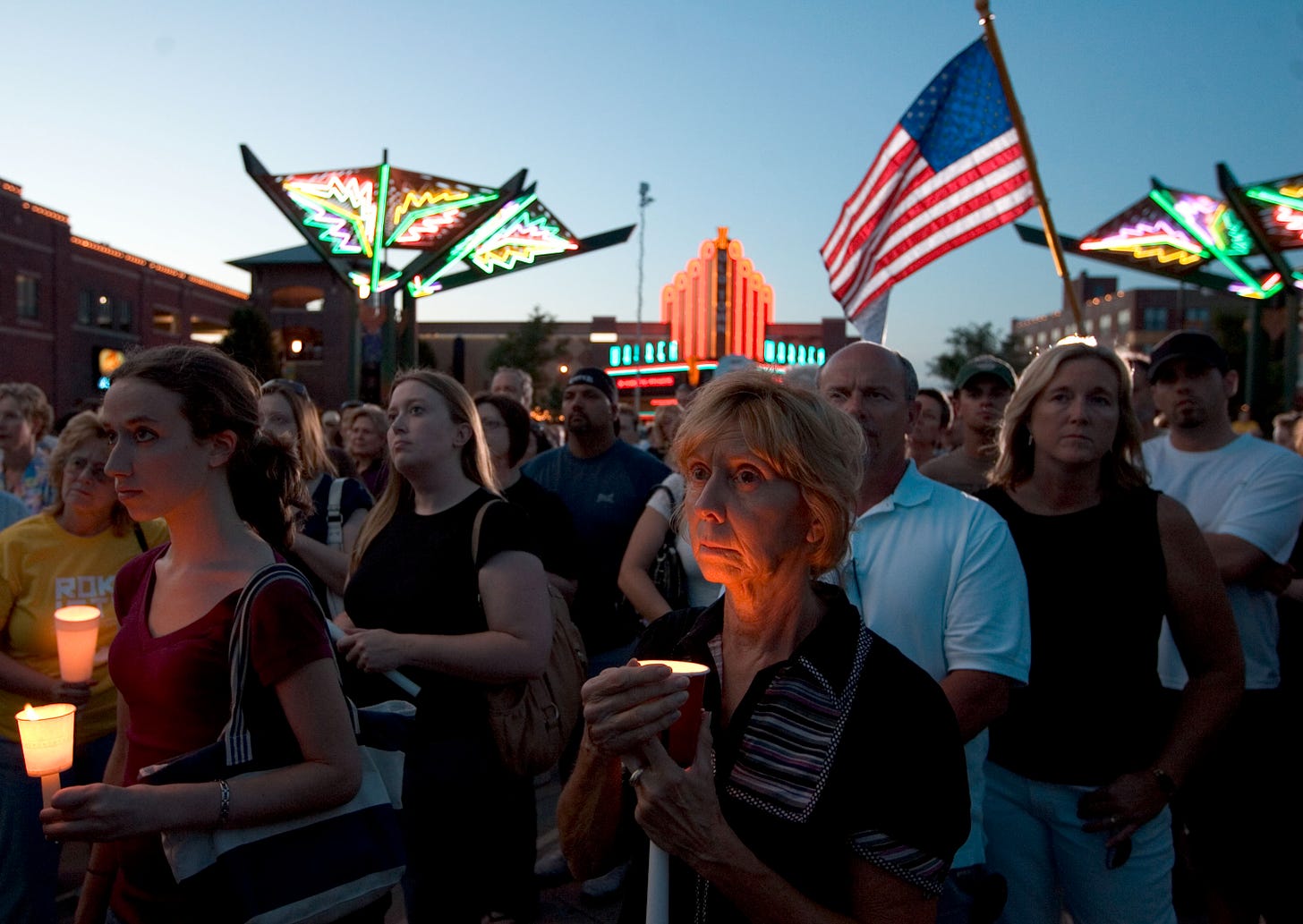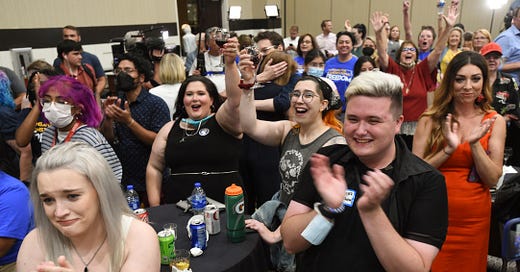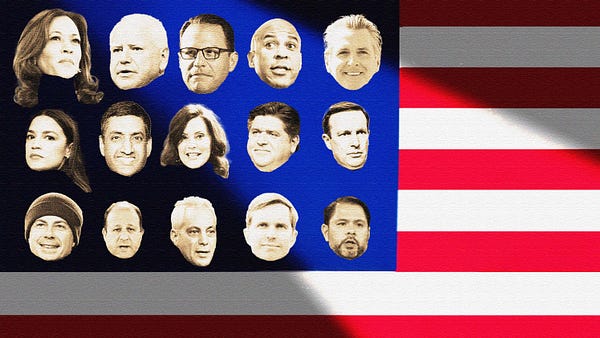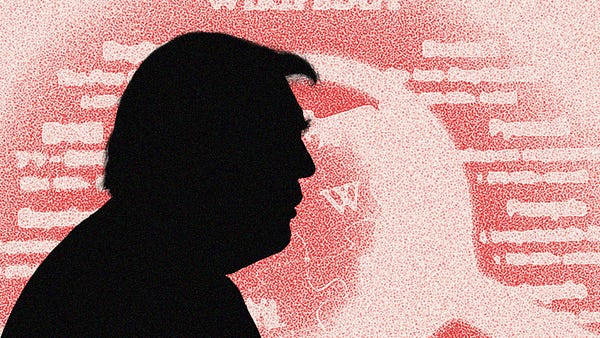
The Free Press

WICHITA — On August 2, Kansans shocked the country, and maybe themselves, by voting overwhelmingly to keep abortion legal in their state.
Kansas—which Donald Trump carried by 15 points and hasn’t voted for a Democrat for president since Lyndon Johnson was on the ballot in 1964—rejected an amendment to remove abortion rights from their state constitution. How did this happen?
I came here to find out.
It’s a packed crowd at Riverlawn Christian Church! Lots of babbling babies, lots of hugs, lots of kids hanging off the ends of the pews. They serve coffee and lemonade and M&M cookies and wait for the band to set up.
It’s going on 9:30 a.m., and we’re in Wichita, where the land stretches into infinite flatness and the sky is massive and gorgeous and arcs across a silver-blue horizon.
It’s been two weeks since Kansans voted 59 percent to 41 percent against the Value Them Both Amendment. Even though it was a major setback for the pro-life movement, and even though the Riverlawn faithful are 100 percent pro-life (or so they say), they’re not here to talk about abortion. They’re here for the same reason they’re here every Sunday—to be with friends and fellow Christians, to pray.
“We look to truth, and our belief is that life is life, and that God has created life—that’s what we share with our folks,” Pastor Jeff Bennett tells me. We’re in the EUROPE room. Meeting rooms at Riverlawn have names like EUROPE and SOUTH AMERICA and AFRICA and ASIA— places where Riverlawn and other evangelical churches have sent people to spread the Word.
It used to be that the Word was the truth, that Scripture was inerrant, but, in recent years, more and more evangelicals have had their doubts about that. (Influential evangelical writers like Rachel Held Evans famously questioned the idea of inerrancy.) Now, things aren’t quite so rigid at a church like Riverlawn.
“We understand that everybody has a different life experience, so how we express these things—we are careful, we are mindful,” Pastor Jeff continues. “I have read that one in four women have actually had an abortion. And so we understand that that’s in our church, and so we want to be careful how we communicate. We want to make sure that they know love and caring, that we will walk with them through whatever life experience they’ve been through. We don’t throw people out. We love on them, and we try to lead them to God and to truth.”
“Whatever transpires, we accept,” Pastor Jeff tells me, “because we know it’s the will of God, and He’s got a plan. And so we move forward with that, and we’re excited to see what He’ll do next.”
In Kansas, pro-lifers vastly outnumber those in the pro-choice camp. (As of August, there were roughly 858,000 Republicans versus 504,000 Democrats, according to the Kansas Secretary of State.) Which makes the August 2 vote all the more confusing.
It’s true that the pro-choicers, as has been reported, probably did a better job of organizing. It’s true that, in the wake of Dobbs v. Jackson, the Supreme Court case that overturned Roe v. Wade, they were more motivated. (A recent Fox poll backs that up.) It’s true that the wording of the ballot initiative was confusing: Many Riverlawn parishioners told me they thought a “no” vote meant no to abortion; it actually meant no to the anti-abortion amendment.
But there’s literally no way to get to a pro-choice majority—let alone a large majority encompassing not only Democratic hubs like Kansas City, Kansas and Lawrence, but several conservative rural and medium-size precincts, like Wichita—minus an act of God. Or a seismic shift in the political consciousness.
“Everybody in America thinks Kansas is so conservative, but Kansas is pretty staunchly anti-government,” Alie Scholes, an emergency medicine doctor, tells me. We’re at a French bistro in Kansas City, about 200 miles from Wichita. Alie grew up just over the state line, in Missouri, and now she lives with her husband, a radiologist, in the upscale Mission Hills neighborhood on the Kansas side of Kansas City. “My entire street is all registered Republicans, except for us, and they all had ‘Vote No’ signs out in their yards.”
Once upon a time, says Sarah Boyd, a former newspaper reporter in nearby Olathe who’s now a spokesperson for a local sheriff, “all I ever heard was pro-life, pro-life, pro-life. That’s why this blew me away, because I thought that was what everybody was thinking, but it wasn’t. It’s just what the loudest voices were saying.”
I drive west to Lawrence, which is lovely and leafy, and home of the University of Kansas. I hadn’t planned on coming here, but on the plane to Kansas City, I sat next to a woman named Molly, who lives in Kansas and told me I had to talk to her sister Meg Roggero and Meg’s husband, Mike Roggero, about the abortion vote. Why? I said. Because they’d changed, Molly explained. Because for them, like for so many Kansans, the abortion vote had been a Rubicon.
Now we’re in a lunch spot in a converted bank building on Massachusetts Street, the main drag, down the block from a make-your-own-t-shirt shop and a virtual-reality arcade. Mike Roggero, a senior project manager at a software company, is telling me why he voted for Donald Trump in 2016.
Back then, he was a “loyal Republican.” His father had been in the military, and Mike had wanted to be a fighter pilot, but his vision wasn’t perfect, so that was out. Trump was not his first pick, but he couldn’t stomach the Clintons. He’d hoped that congressional Republicans would rein in some of Trump’s eccentricities. But instead of Trump becoming more like them, they’d become more like Trump. He hated the way they’d treated Rep. Liz Cheney. “I will not vote for any Republican that backs Trump or MAGA,” Mike says.
In 2020, he voted for Joe Biden.
“I would probably never get an abortion if I was a woman, or ask my significant other to have an abortion, but I believe that it is their right to do it,” Mike tells me. “I am a Republican but very much on the fence now, and leaning more independent.”
Meg Roggero was a social worker before she worked at an adoption agency, and now, she says, she’s a research assistant at the University of Kansas studying the effects of adversity on child development. She says she was an independent until the abortion vote, when she switched her registration to Democratic. “I’ve never had a sign in my front yard ever—we’re not the type to do that,” she says. “We did have a sign up for this.” They both voted no.
“Everybody’s ecstatic,” Artie Scholes tells me. Artie is Alie Scholes’ brother and the owner of the 403 Club, a bar and pinball emporium that hosts the Kansas State Pinball Championship every year. For women, he says, it’s just: “‘Don’t tell me what I can and can’t do with my body, you know? Who the F are you to say anything?’” But it’s not just women, he says. “I think some of those are gun people. Like, ‘I don’t want you to take my gun. I’m not going to tell you what to do with your body.’”
We’re at the club—Artie, me and Artie’s friend, Brent Anderson, a creative director at a local ad agency. Anderson shows me texts that the pro-lifers sent to him and tons of other voters. The texts were meant to deceive, instructing people to vote YES to support a woman’s right to choose. (NO was, in fact, the pro-choice vote.)
“Bullshit, nice try,” Anderson texted back.
Scholes says that his sister, Alie, told him she might have to perform an emergency abortion to save the life of the mother. “She was like, ‘You’ll bail me out of jail, right?’” Artie says. This was right after Dobbs. “We were all like, ‘Yeah, of course, we will.’”
Sharice Davids, the Democratic congresswoman who represents the western part of Kansas City and the surrounding area, the only Democrat and the only woman in the state congressional delegation, portrays the August 2 vote as a triumph of the pro-choice forces. “After Roe was overturned and we watched our neighboring states like Missouri and Oklahoma pass these extreme trigger bans, this ceased being hypothetical for Kansas,” the congresswoman says in an email. (Trigger laws ban or severely restrict abortion and were passed ages ago but only took effect after Roe was overturned. Thirteen states had them.) “Folks were telling me they are angry and scared—and they don’t want those dangerous policies coming to our state. A broad coalition came together to reject extremism in August, and we’ll do it again in November.”
Davids’ statement echoes that of the president and many other Democrats.
But that seems like just one part—and maybe a small part—of what is happening here. The abortion vote, says Anderson, the creative director at the ad agency, was monumental. It was, he says, a wide swath of Kansans, not just Democratic partisans, finally breaking through the white noise that filled the airwaves, smothered the discourse, made it impossible for ordinary people, normies, the non-political types too busy paying their rent or their student debt or Uber-ing or Airbnb-ing or whatever to make themselves heard. “It’s an indicator,” he says, “that the conversation we hear on the talking-head-news shows every night and from elected officials is not how the majority of people actually think.”
“I think Kansas could be a whole other world now,” Sarah Boyd, the former newspaper reporter, says. “I feel like Missouri used to be a bellwether state. I think maybe Kansas could become that.”
In early August, the little streets crisscrossing the small towns and farming junctions are quiet and sun-dappled, punctuated by low-lying, brick facades and the occasional Casey's General Store and gas station. In Burlingame, just south of Topeka, the state capital, it hits 97. It seems to get hotter as I drive south, past the park, the rodeo arena, through 120 miles of cornfields and cattle and dead armadillos baking on the side of the road.
All the way to Wichita, to Pastor Jeff.
He wants to make it clear they’re not monsters, the pro-lifers. Actually, the opposite. The pro-choice people, he says, always talk about ectopic pregnancies or rape or incest. He calls that “fearmongering.” Nobody at Riverlawn, he says, wants to force a pregnant woman who’s been raped to give birth.
That won’t assuage abortion-rights activists, but it does sound like a softening, like moderation. (In an August 1999 report, the Family Research Council, one of the most powerful pro-life groups in the country, argued against aborting fetuses that resulted from rape. “Considering,” the report states, “that the effects of abortion are very similar to the effects of rape, is abortion a healthy solution for the pregnant rape victim?” It was, if nothing else, ideologically consistent.)
Outside EUROPE, the service is about to start. The stage is filled with a purple glow, and there’s a giant cross behind it, and a young pastor with a microphone, in baggy jeans and Adidas sneakers. When the band starts up with “Lord, I Need You,” worshippers lift their palms and sing. A church member gives me a parting gift: a ballpoint pen and a card that reads: “You are LOVED You are SPECIAL You are VALUED.”
It’s easy, in the middle of the glow, the hugs, the boundless warmth, to forget that, just a few miles from here, a man named Scott Roeder shot and killed the doctor George Tiller while Tiller was serving as an usher at Reformation Lutheran Church. This was many Sundays ago, in 2009. The reason? Tiller was one of the few doctors in the country who performed late-term abortions. In the pro-choice universe, Wichita inhabits an especially dark place.

This is the tension—between the recent past and the present—that seems to course through the whole of Kansas.
Seven miles south of Riverlawn, I stop at Nortons Brewing Company. It’s packed, and there are no empty seats except one at the bar. I sit down next to a man, who looks to be in his early forties. He’s in a Kansas Jayhawks football cap and working his way through a burger and a paper tray of fried pickles.
Jesse Geffs is bearded and pale. When he was a teenager, he tells me, he groomed elephants for a traveling circus, and he says he worked on oil rigs, and spent years struggling with alcohol, weed and meth. His son was a baby when he died in his arms (sudden infant death syndrome, SIDS). He wants his daughter, his dead son’s twin, to move in with him. He’s been staying at a group home for the past year, but now he’s looking for an apartment so they can live together. He’s trying to make things right.
Anyway, abortion. He’s for it. Or, at least, the right to have one. He thinks people make mistakes, things happen—he should know—and anyway, who is Jesse Geffs to tell a woman what to do with her body? He’s echoing what a lot of Kansans seem to think.
“I am a Christian,” says Geffs, who attends a Pentecostal church in nearby Haysville. “There's a lot of really good people in there, and I respect everybody at the church, but like I said, a lot of me and them got different political views.”
Jesse couldn’t vote August 2—he says he’s a felon—but he knows how he would have.
Nancy Rommelmann’s last piece for Common Sense was about the effects of inflation on small-business owners. You can read it here.













Peggy Noonan of the WSJ wrote an excellent piece on this. Much more constructive.
Seems to me the people of Kansas, in determining their own path with respect to abortion law is precisely what the Constitution demands, as POTUS affirms. I have my doubts about abortion. Never have found a way to minimize taking the life of an innocent. I’ve seen too many ultrasound images. As an engineer for many years, my own definition of when life begins, is analogous to running software code, executing the script of life in an unbroken sequence from conception to natural death.
It’s complicated. Truly a tragedy for all involved. I understand abortion is sometimes necessary, and can’t sit in judgement of anyone who makes the their own decision either. However, Roe was a decision that distorted the Constitution, and needed correction. POTUS was correct of course—even Justice Ginsberg thought the decision was too far-reaching and too sweeping. Bittersweet. Kansas made their own choice, just as intended.